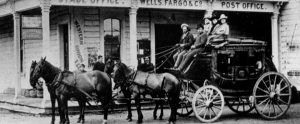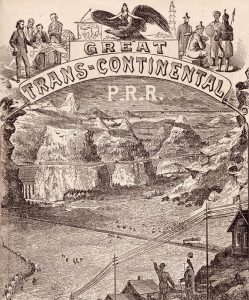By William Daugherty, for the Reno Evening Gazette in 1891.
The following account of how Wells, Fargo & Co. disposed of their Montana stage line that ran from Salt Lake City to Helena, at the time of, and before the completion of the transcontinental railroad, is told to illustrate the character of men that wreck railroads. The story is old, but in view of the fact that it is historical and marks a transition period in overland locomotion, it is retold.

Wells Fargo Stagecoach
In the early 1860s Wells, Fargo & Co. purchased the Overland Stage line from Ben Holladay, and the company continued to run it until it was displaced by the railroad in 1869. In the summer of 1868 Wells, Fargo & Co. sent out from New York City a trusted agent to examine the condition of their immense stage property and to recommend the most feasible plans of disposing of it as fast as its usefulness was destroyed by the advance of the railroad. The line then extended from Wadsworth to Salt Lake City and beyond to the Platte River, with an important sideline into Montana.
This last one was in no danger of being disturbed by any railroad for some years after the completion of the overland, and while it was doing an immense business then, it had also in prospect a long continuation of prosperity ahead of it. The agent from New York was a man of great reserve and aristocratic bearing, who wielded his power in a very autocratic manner and who drove some hard bargains in disposing of the stage property west of Salt Lake City. He sold it, at some sacrifice, to different companies, who utilized it in running sidelines to connect the mining towns with the railroad, and generally took in payment the amounts to come due on unexpired mail contracts.
The sales were all duly ratified by Wells, Fargo & Co.’s Board of Directors then residing in the east, and the agent’s course proved so satisfactory that he was given plenary powers to contract sales of all their different lines. He was not slow in discerning the value of the Montana line, and early in his administration laid a scheme which he intended should inure to his own benefit. He commenced by exchanging the best stock and finest coaches from other parts of their lines for the old and worn, upon this one, until it was the best equipped of any part of their large system. He did this because he had determined to possess himself of this fine piece of property when all the other was disposed of. To do this, he found he must have a dummy to make the deal with, and as all the previous sales had been, to a great extent, made to old employees of the company, he concluded to select a well-known division agent on the Montana line to co-operate with and make the sale to, and after it was ratified by the directors, buy him out, and if required, be ready to make some plausible explanation.
But, until he got the property in this roundabout way, the utmost secrecy was required. Having evolved the plan, he took into his confidence the man he had selected, and who readily assented, for a prospective interest, to join in the scheme. The property was worth $200,000, but the agent represented to the directors that in view of the uncertainties and precarious nature, of business in the mining territories, and the fact that all the other lines were disposed of, it would be good riddance for the company to part with this, even at a little sacrifice, and as he had found a purchaser willing to give $40,000 in cash for it, he recommended its immediate sale.
The company did just what he expected, summoned him at once to New York for consultation upon this last prospective sale. He left his confederate with instructions to act upon telegraphic consent, as soon as the sale was sanctioned and ratified. His confederate had no money and expected that it would be provided by the agent„ but as the whole business was done by winks and nods, and expressions like “I understand,” and “That’s all right,” no arrangements were made for the money, the confederate supposing it would require only a stroke of the pen by the agent to settle that part of the transaction.
The agent went to New York and was so successful in his efforts, that the confederate soon received a telegram from Wells, Fargo & Co., consenting to the sale for $40,000, spot cash to be deposited at once in Wells, Fargo & Co.’s bank at Salt Lake City, and the property to be delivered by the agent as soon as he could return from New York. The confederate had to think and act quickly, and hastening into Salt Lake City he made arrangements for a temporary loan of the money, knowing as he did that the property was well worth five times the price named. He did not dare telegraph the agent for an explanation or for instruction on what to do, and he acted without hesitation and soon had the money deposited in the bank.
This fact was telegraphed, and acceptance signified on the return of the trusted agent to Salt Lake City. In a few days, he arrived and at once started over the line with his confederate and a partner to make a transfer of the property. This was accomplished in a few days, and they returned to Salt Lake City to deliver the bill of sale and make formal delivery of the money.
This was done with as much expedition as was possible in fear of some “slip twixt the cup and the lip,” which hastened both parties. When all was finally accomplished and it was duly published to the world that Jack Gilmer, the former division agent of the overland, and a contemporary of Slade, was the owner of the Montana line, the agent called him aside and said: “Now we will fix our little business and arrange for your interest in the line.”
Then it was that the second schemer showed his hand, and Jack Gilmer, in his peculiar nasal treble tones that were known all through the West, said: “Not much; I’m the sole owner of the Montana stage line; I bought it, and have no partner, and don’t intend to have, for I got it pretty cheap.”
The trusted agent glared at Jack in speechless surprise. Jack glared back from under his tilted hat brim and elevated his cigar to an angle of 45 degrees, and simply added “That’s what’s the matter.” The agent could do nothing, and, completely crestfallen, he returned to the East, but he never squealed, while Gilmer waxed rich from his rascality.
By William Daugherty article in the Reno Evening Gazette, May 27, 1891. Compiled and edited by Kathy Weiser/Legends of America, updated June 2021.
About the Author: Written by William Daugherty, for the Reno Evening Gazette in 1891. The Reno Evening Gazette was first published on October 12, 1876, and continued for the next 107 years. In 1977, it was merged with the Nevada State Journal and continues to exist today as the Reno Gazette-Journal.
Also See:
Pioneers on the Nevada Frontier (Reno Evening Gazette)
Nevada Mining Tales (Reno Evening Gazette)
Pioche Land Jumpers and the Death of Jack Harris (Reno Evening Gazette)
Violence on the Nevada Frontier (Reno Evening Gazette)


